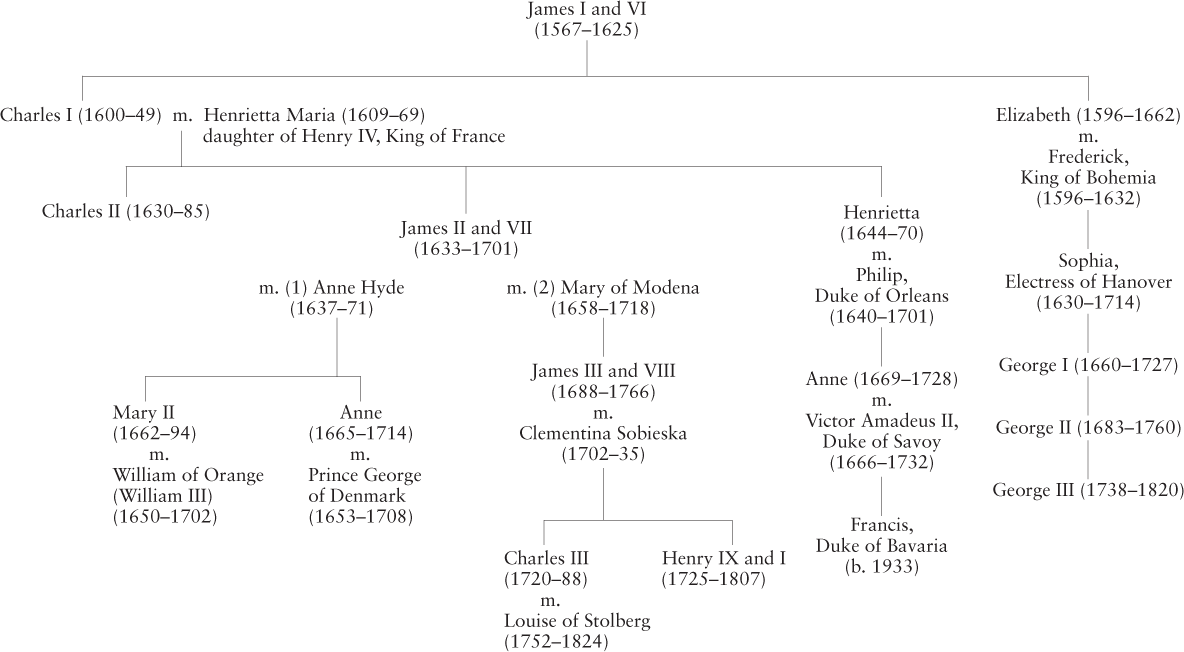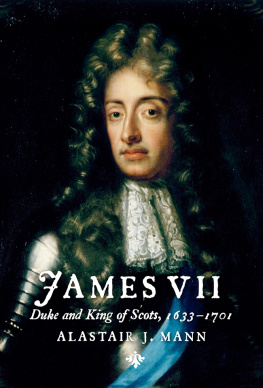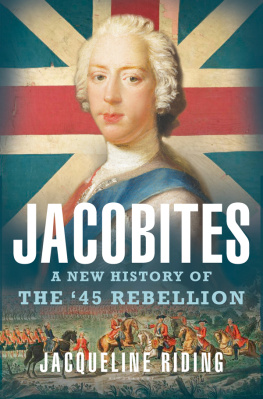

First published in 2019 by
Birlinn Limited
West Newington House
10 Newington Road
Edinburgh
EH9 1QS
Copyright Desmond Seward 2019
ISBN 978 1 78885 307 1
The right of Desmond Seward to be identified as Author of this work has been asserted by him in accordance with the Copyright, Designs and Patents Act 1988. All rights reserved. No part of this publication may be reproduced in any form or by any means without permission from the publisher.
British Library Cataloguing in Publication Data
A catalogue record for this book is available from the British Library.
Designed and typeset by Initial Typesetting Services, Edinburgh
Printed and bound by Clays Ltd, Elcograf S.p.A.
For
Hugo and Elizabeth
and for
Kit, Lettie and Millie
Although God hath given Mee three Kingdomes, yet in these He hath not now left Me any place, where I may with Safety & Honour rest my Head.
King Charles I, Eikon Basilike, or The Kings Book
Contents
PART ONE
JAMES II THE LOST THRONE
PART TWO
JAMES III A SECOND RESTORATION?
PART THREE
WHIG TYRRANY
PART FOUR
A KING IN WAITING
PART FIVE
CHARLES III AND GEORGE III
PART SIX
TWILIGHT
List of Illustrations and diagrams
Colour plates
James II and VII with Mary of Modena
Sir Neil ONeill
James III and VIII
The Duke of Mar Bobbing John
James III and VIII marries Clementina Sobieska
Prince Charles Edward Stuart in the 1740s
An Incident in the Rebellion of 1745
The last male Stuart as Duke of York and as Henry IX
Black-and-white plates
The exiled James II is welcomed to St Germain-en-Laye by Louis XIV
James Graham of Claverhouse Bonnie Dundee
The Duke of Tyrconnell Fighting Dick Talbot
Patrick Sarsfield, Earl of Lucan
Mary of Modena
Lord George Murray
Bishop Atterbury
Flora Macdonald
Clementina Walkinshaw
Dr William King
Dr Samuel Johnson
Charlotte, Duchess of Albany
Diagrams

Prologue into Exile
I call to God to witness that I go not on my own motive; but if I stay in the kingdom I am very well informed of my destiny, and that no king ever came out of the Tower but to his grave.
James II
In the small hours of 23 December 1688, a tall, thin, middle-aged man and an equally tall youth, accompanied by two other men, stole out from the backdoor of a large house in Rochester High Street. In the darkness, the little group crept silently through the garden, then down to the River Medway, where a small boat was waiting.
Rowing out into the estuary they hoisted the sail but found wind and tide against them, so for a time they took refuge on board a man-of-war whose captain could be trusted. It was evening before they reached their destination, a big sloop called the Henrietta, with a skipper who was also a naval officer. He set sail immediately.
The tall man was King James II and VII, who would never again set foot on English or Scots soil, and the youth was his natural son, James FitzJames, Duke of Berwick. The other two were courtiers.
The king had left a note, written just before he fled, His Majesties Reasons for Withdrawing Himself from Rochester, which at his wish was printed and published soon after. In it he complains of his son-in-law (and nephew) William of Orange replacing his Whitehall guards by Dutch troops, then sending to me at One a Clock, after Midnight, when I was in Bed, a kind of an Order by three Lords, to begone out of mine own Palace before Twelve, that same Morning. How can he feel his life is safe with a man who treats him like this, who says he does not believe the Prince of Wales is the kings son, who makes him appear as black as Hell to my own People, and to all the World besides?
He explains that he is leaving his kingdom to be within call whenever the Nations Eyes shall be opened, when he hopes a new Parliament will agree to Liberty of Conscience for all Protestant Dissenters; and that those of my own [Catholic] Perswasion may be so far considered and have such a share of it, as they may live peaceably and quietly as Englishmen and Christians.
Yet this was the policy too tolerant rather than intolerant that had led to his downfall.
For many, the moment when the Henrietta sailed for France with King James on board marked the end of Britains rule by her ancient, natural and rightful line of sovereigns. It was also the beginning of Jacobitism.
Introduction:
Jacobites English, Scots and Irish
... if thou wilt restore me and mine to the Ancient rights and glory of my Predecessours.
King Charles I, Eikon Basilike
The Jacobites were men and women who refused to accept the Glorious Revolution of 1688 in which William of Orange deposed James II. For seventy years, English, Scots and Irish, did their best to restore the wronged House of Stuart first James, then his son, and then his grandson.
The events of 1688 were not so much a revolution as an aristocratic coup detat that ended in a one-party state while, far from always trying to set the clock back, the Jacobites came to offer an escape from rule by a corrupt oligarchy. Until forty years ago they were dismissed as a handful of kilted anachronisms from the wilder areas of the Celtic Fringe. Nowadays they are taken much more seriously, but the new insights are restricted to academics.
Most recent books about the Jacobite movement have concentrated on the rising of 17456 that ended at Culloden, but these fail to tell the whole story in England, Scotland and Ireland, from James IIs flight in 1688 until his grandson Henry IXs death in 1807. This is to omit the context that explains the Jacobites motivation.
Their cause involved the entire British Isles, and if English, Scots and Irish Jacobites had somewhat different aims, they were all part of the same movement. Because of Scotlands heroic contribution they are often seen as purely Scottish, ignoring the Irish war of 168991 and plans for risings in England and Ireland that were on the cards until well into the 1750s. Too many historians tend to forget that the Jacobites of each kingdom (and in a diaspora reaching from Russia to America) had the same objective a Stuart Restoration.
Support for their would-be counter-revolution was underestimated by historians who until the late twentieth century failed to recognise their importance over many decades in British politics. Contemporaries did not make the same mistake. In 1738 Robert Walpole warned the House of Commons that Jacobites are, I am afraid, more numerous than most gentlemen imagine. They were taken very seriously indeed by the major European powers the policies of the first two Georges in Germany ensuring that Hanover never lacked for enemies abroad. France, Spain, Sweden, Russia and Prussia all contemplated restoring the Stuarts France considered restoring them in Ireland as late as 1796.
The Jacobite movement should be seen as the saga it was a tale of loyalty and hope, yet in the end of bitter disillusion, lived by men and women who sacrificed all they had to restore the banished royal family. Few causes have aroused a more gallant response from the peoples of these islands than the Honest Cause, whether they were fighting for it at Killiecrankie, Prestonpans or Culloden, at the Boyne, Aughrim or Fontenoy, or dying for it on the scaffold.

















